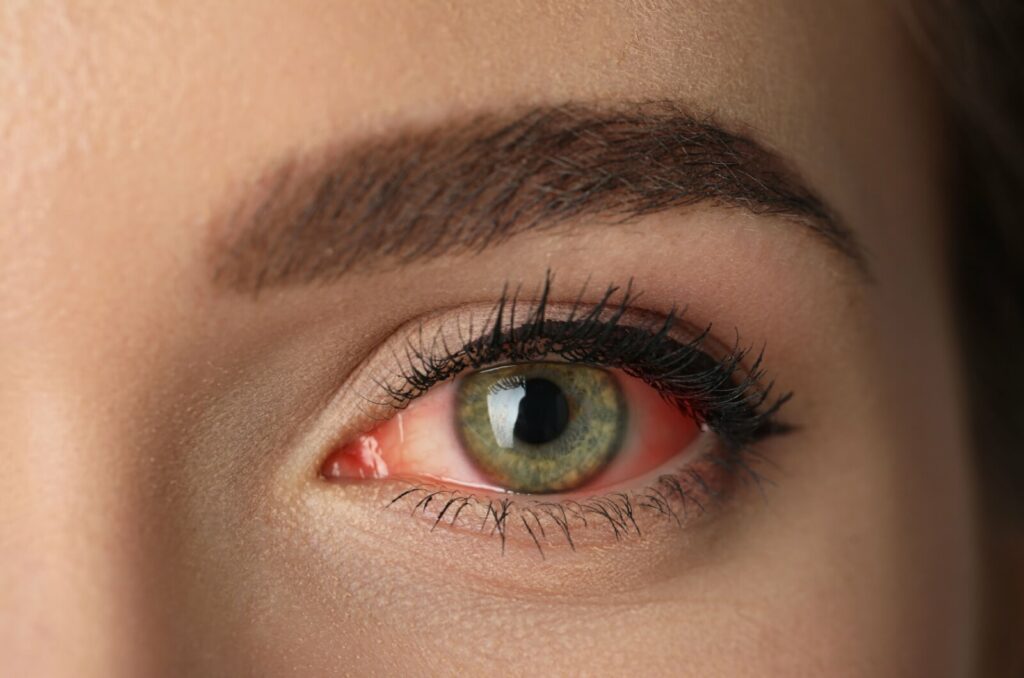Many rush to the conclusion that it’s pink eye or conjunctivitis when their eyes get red or itchy. But is it really? A few other conditions commonly misdiagnosed as pink eye include:
- Allergies
- Having a foreign body in the eye
- Dry eye syndrome
We provide guidance on narrowing down what’s going on with your eyes in this article. Ultimately, you should see your eye doctor for an eye exam if your symptoms persist or you’re experiencing extreme discomfort. They can determine what’s happening and provide tailored advice and treatment.
Understanding Pink Eye
Pink eye, medically known as conjunctivitis, is a widespread eye condition. It involves inflammation or infection of the conjunctiva, the transparent membrane that lines your eyelid and covers the white part of your eyeball. The telltale signs include redness, itching, and a gritty feeling in the eye, often accompanied by a discharge that forms a crust during sleep.
Causes of Pink Eye
There are several culprits behind pink eye:
- Viral infections are the most common cause, often linked to the same viruses that cause the common cold.
- Bacterial infections can also lead to pink eye, requiring antibiotic treatment.
- Allergies, like pollen or dust, can trigger allergic conjunctivitis, causing redness and itching.
- Irritants such as smoke, chlorine in swimming pools, or other chemical exposures can also result in chemical conjunctivitis.
Symptoms of Pink Eye
Recognizing pink eye involves looking out for:
- Redness in one or both eyes
- Itchiness or irritation
- Watery or thick yellow discharge
- Swollen eyelids
- Sensitivity to light
Common Conditions Misdiagnosed as Pink Eye
While pink eye is a common diagnosis, several other conditions mimic its symptoms. This can lead to misdiagnosis and inappropriate treatment. Here are some conditions that are often mistaken for pink eye:
Allergies
Allergic reactions can produce symptoms remarkably similar to pink eye, such as redness, itching, and watery eyes. However, allergy-related conjunctivitis often affects both eyes and is accompanied by other allergy symptoms like sneezing and a runny nose.
Foreign Body Sensation
Something in your eye, like dust or an eyelash, can cause redness, irritation, and tearing, resembling pink eye symptoms. But this condition often resolves once the foreign object is removed.
Dry Eye Syndrome
Dry eye syndrome causes a gritty feeling, redness, and irritation, similar to pink eye. But dry eye syndrome is usually chronic and not infectious unlike pink eye. Dry eye is prevalent, so you should discuss treatment options or supplements that may help reduce your symptoms.
How to Differentiate Pink Eye from Other Conditions
Distinguishing pink eye from other eye conditions is essential for appropriate treatment. Here’s how you can differentiate between them:
Medical Examination
A thorough eye examination by your eye doctor is crucial. They can use specialized equipment to examine the eye closely, identifying signs that differentiate pink eye from other conditions.
Symptoms & Duration
Noting symptoms and their duration can help. Pink eye typically involves continuous redness and discharge, whereas conditions like dry eye syndrome may fluctuate in severity throughout the day.
Medical History
Considering your medical history can offer clues. For instance, a history of allergies might suggest allergic conjunctivitis, while recent cold symptoms could point to viral conjunctivitis.
The Importance of Accurate Diagnosis
Accurate diagnosis is paramount in managing eye health effectively. Misdiagnosing pink eye can lead to unnecessary treatments, such as inappropriate use of antibiotics, which contribute to resistance. For example, antibiotics are ineffective against viral infections.
Preventing Spread of Infection
Proper diagnosis helps in preventing the spread of infectious pink eye. Viral and bacterial conjunctivitis are highly contagious, and appropriate precautions must be taken to avoid transmission.
Ensuring Proper Care
Accurate diagnosis ensures you get the care and treatment you need. For instance, allergic conjunctivitis may require antihistamines, while dry eye syndrome might need lubricating eye drops.

Tips for Seeking Professional Help
Knowing when to seek professional help is critical in managing eye health. Here are some tips:
#1: When to Consult a Healthcare Professional
Seek medical advice if you experience severe pain, changes in vision, or symptoms persisting for more than a week. Also, promptly consult your eye doctor if you have a weakened immune system.
#2: Importance of Regular Eye Exams
Regular eye exams are crucial for maintaining eye health. They can detect conditions early on, preventing potential complications. The Canadian Association of Optometrists recommends that most people get a comprehensive eye exam every 1 to 2 years based on age and other health factors. You should always follow your optometrist’s recommendations as they consider your particular situation.
#3: Be Proactive in Eye Health
Don’t ignore eye discomfort or dismiss it as minor. Taking proactive steps and consulting professionals ensures that any issues are addressed promptly and effectively.
Talk to Us Today About Your Symptoms
In eye health, assuming symptoms are due to pink eye can lead to misdiagnosis and mistreatment. Various conditions mimic pink eye; understanding these can help you seek appropriate care.
Prioritize getting accurate diagnoses and consult your eye doctor when in doubt. Your eyes deserve the best care, so don’t settle for anything less.
Call our team at See Eye Clinic today to book an exam. One of our experienced optometrists can examine your eyes and offer tailored advice and treatment for whatever is causing your symptoms.




















